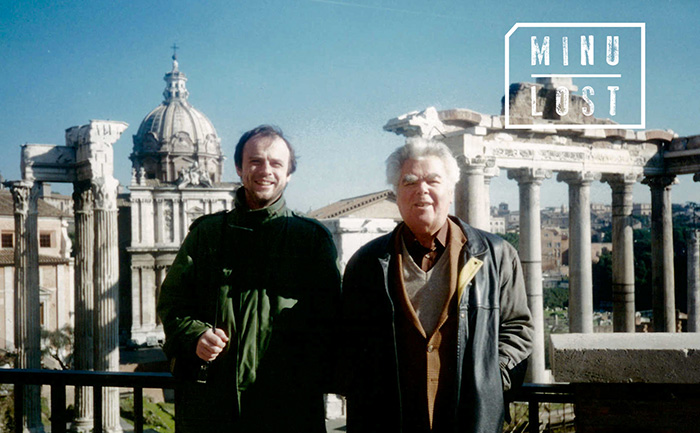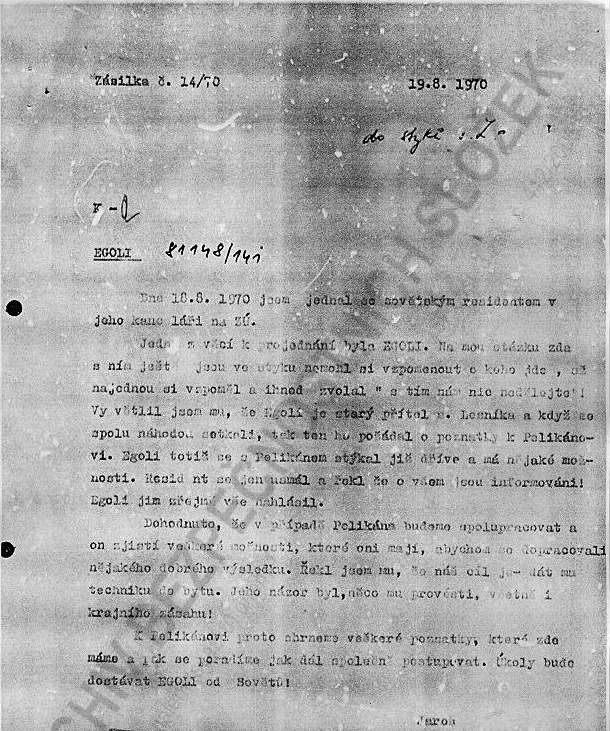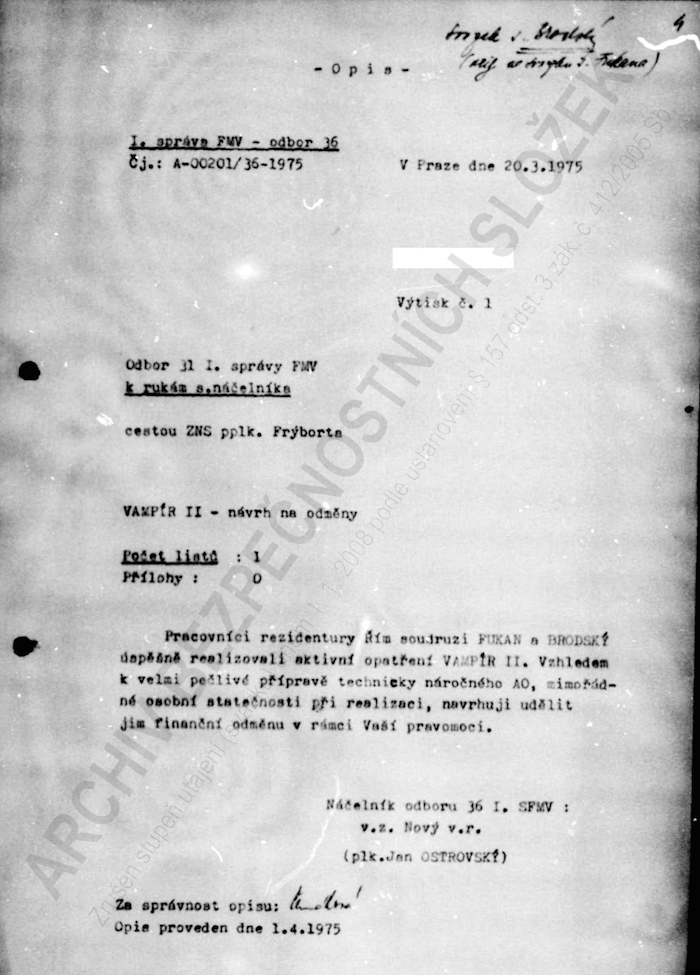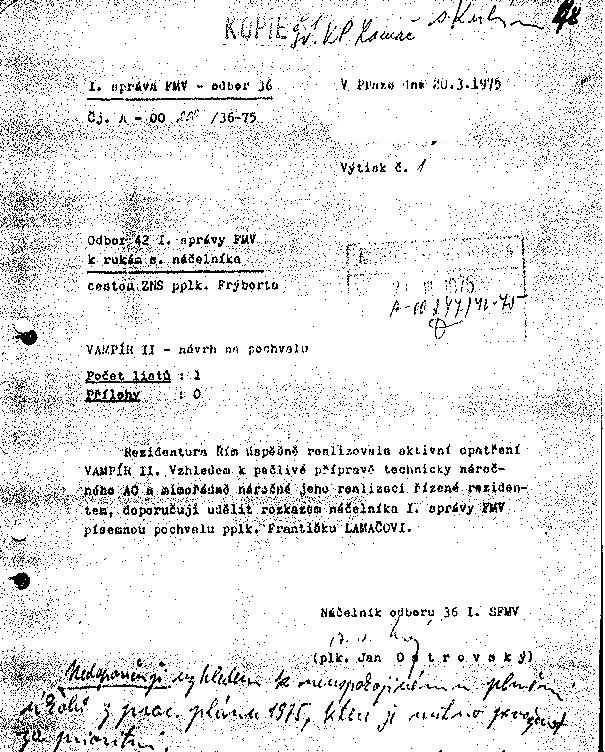The attempt to assassinate Jiří Pelikán
Radek Schovánek
This February, forty years have passed since one of the most despicable actions of Communist Czechoslovakia’s foreign intelligence after 1969. Two members of the residency in Rome Jaroslav Forst “Fukan” and Milan Jelínek “Brodský” sent Jiří Pelikán a “present” in the form of a book bomb on the eve of his fifty-second birthday.
Upon opening the parcel, what appeared was the back of a book, inserted in a box cover with the inscription American Almanac. Years later Jiří Pelikán recalled the suspicion which the parcel immediately raised in him. He had not ordered any such book and at the time, he had been getting envelopes by post for several months already, containing newspaper cuttings with articles about victims of terrorist attacks in Italy. These letters were also actions of the Communist intelligence. Moreover, the parcel was sent by registered post and this way of sending books was never used, as it was unnecessarily expensive. To be on the safer side, he opened the door to the corridor leading toward the staircase and started slowly pulling out the book. Suddenly, a long flame burst out of the cover, setting fire to a drape. Mr Pelikán immediately threw the “book” under the staircase from where a muted explosion sounded.
Yellow mark - Jiří Pelikán’s flat
Investigation by Italian police proved that the devilish device was not supposed to kill Mr Pelikán but that it could have caused him to lose his fingers or his eyesight, or that he could have suffered severe shock or other similar damage. In 2004, Prague 6 district judge Markéta Binderová ruled that the explosive could not have harmed Mr Pelikán more seriously and that therefore the whole case was expired. The four former members of the State security on trial did not omit to repeat the lies which they had spread after the assassination attempt in Rome, namely that Mr Pelikán set up the entire event by himself in order to increase the public interest in his own person.

The author of the article with Jiří Pelikán in 1996.
At the beginning of the 1970s when the magazine Listy started appearing in Rome, its founder and editor Jiří Pelikán immediately became one of the most heavily surveilled targets of the Communist foreign intelligence. The magazine published backstage information from Czechoslovakia and also primarily targeted the readership there. In November 1969, the later assassination agent Jaroslav Forst “Fukan” started an object file with the registration number 12406 “Czechoslovak emigration in Italy”. One of the sub-files was kept also on the editor of the exile magazine Listy.
The surveillance of Mr Pelikán was coordinated with the Soviet KGB from the beginning, as is proven by the record of the meeting of Ferdinand Viduna “Jaroš”, resident agent of the State security in Rome at the time with the KGB resident agent on 18 August 1970. At the meeting, they discussed the coordination of the steering of KGB collaborator Emo Egoli. Emo Egoli was active in Prague in the 1950s as Mr Pelikán’s deputy in the International Student Union and cultivated “friendly” contacts with him. His wife was born in Czechoslovakia and he himself spoke Czech. Another interesting fact is evident from the document. While the collaborators of the State security in Rome were being constantly reminded of the ban on contact with Egoli, because he was steered by the KGB, both collaborators of the Intelligence service of the Chief of staff legalised at the residency in Rome kept meeting him frequently because he was not a person of interest for the GRU, i.e. their superior service. Their mutual contacts are recorded in an extensive nine-part file which was terminated only in November 1990 and which is preserved in the Security Services Archive.
for contact with Z.
K-R
EGOLI 81148/141
On 18.8.1970 I had a meeting with the Soviet resident in his office at the Embassy. One of the issues on the agenda was EGOLI. Upon my question whether they still are in contact with him he could not remember who he was, until suddenly he remembered and called out immediately “don’t you do anything with him”! I explained to him that EGOLI was an old friend of comrade Lesník and that when they met by chance, he asked him about information on Pelikán. Egoli had namely been in contact with Pelikán earlier and he had some options. The resident just smiled and said that they were informed about everything. Egoli had probably reported everything to them. We agreed that in the case of Pelikán we would cooperate and he would find out all possibilities which they have for us to reach a good result. I told him that our goal is – to place technical equipment in his flat. His opinion was to do something to him, including an extreme intervention! We shall therefore summarise all knowledge about Pelikán which we have and then we shall confer on how to proceed jointly. Tasks will be given to EGOLI by the Soviets!
Jaroš

As far as results were concerned, the residency in Rome ranked among the worst in the middle of the seventies. For the first half of 1974 they did not obtain one single piece of information classified as very valuable or valuable. The only one to provide some results was Ingeborg Mašatová who was considered a very valuable agent because she forwarded information about the smuggling of religious literature into the USSR and uncovered several couriers. In 1969, the KGB took over the steering of Giuseppe Ferrarini who eventually became secretary of three Ministers of Interior, his wife becoming secretary of the President of Italy. Both these foreign intelligence cases were however directed mostly from the central office in Prague, the residency only being responsible for the protection against surveillance.
 On the right - Giuseppe Ferrarini (“Doktor”), source: Minulost.cz
On the right - Giuseppe Ferrarini (“Doktor”), source: Minulost.cz
The unsatisfactory situation regarding the results of agent activity, the inability of the State security to prevent the publication of Listy as well as the amount of Jiří Pelikán’s contacts probably led to the establishment of the object file with the registration number 12613 and the code name Slovan on 6 December 1974. This was less than a month before the assassination attempt. The State security thought that it would manage to intimidate and silence Jiří Pelikán before the meeting of the Helsinki conference. In December 1974 a young ambitious State security agent with the name Milan Jelínek “Borský” started working at the residency in Rome. In his timesheet for January 1975 it says on the last two days “Action Vampire II. Work trip Milan”. Almost two months later the chief of the Section for active measures (Section 36) Jan Ondrovčák proposes a reward for both potential assassins: “The collaborators of the residency in Rome Fukan and Brodský have successfully executed the active measure Vampire II. In view of the very careful preparation of the technically demanding active measure and the extraordinary personal courage during the execution, I propose to bestow upon them a financial reward within your competence.”

It is clear from the document how much courage a State security agent in Italy had to amass in order to send a parcel from the post office. Jan Ondrovčák proposed to bestow a written commendation in the order of the chief of the foreign intelligence to František Poštůlka “Lamač”, the resident agent in Rome. However the direct superior of the resident refused to do that, on the grounds of non-fulfillment of the plan of activities of the residency which he considered more important. He probably assumed that the purpose of an intelligence service was more like collecting and analysing information rather than sending letter bombs.
Italian media covered the assassination attempt widely and nobody doubted that it was the work of the State security. Jiří Pelikán did not stop publishing Listy and four years later, he became Member of the European Parliament for the Italian socialist party.
Radek Schovánek (born 1964) – Czech researcher and writer. Between 1993-1998 he worked for the Office for the Documentation and Investigation of Communist Crimes of the Police of the Czech Republic. He was a collaborator of the Czechoslovak documentation centre led by Prof. Vilém Prečan in 1998-2005, he worked for the Slovak Nation’s Memory Institute in 2005-2007, for the Institute for Contemporary History in 2007–2008 and for the Institute for the Study of Totalitarian Regimes in 2008-2015. Currently he is an employee of the Ministry of Interior of the Czech Republic.



